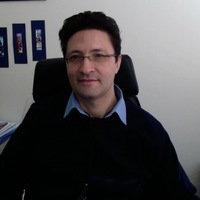
M. Murat Civaner
I am a professor of medical ethics and history of medicine at Uludag University School of Medicine in Bursa, Turkey. I have a PhD degree in ‘Medical Ethics and History of Medicine’ (Ankara University, 2006), and also a PhD degree in “Public Health’ (Dokuz Eylul University, 1999).
I am working as a professor of Medical Ethics and History of Medicine at Uludag University School of Medicine in Bursa, Turkey. My professional duties include teaching, ethics consultation, and research. I am teaching medical ethics and history of medicine to medical students, to our master and PhD students, and also research ethics to future researchers.
I am a member of Patient Rights Committee in our university hospital, Uludag University Centre for Health, Practice and Research, which handles patient complaints weekly. I also work in the Hospital Ethics Committee, established for case review, guideline development, and training physicians. I have been honoured by Hans-Joachim Schwager - Prize for Clinical Ethics in 2017 for recognizing my efforts for the development of clinical ethics consultation in our university hospital, and establishing a Hospital Ethics Committee.
http://www.clinical-ethics.org/hans-joachim-schwager-award/2017-singapore/
I serve as an “Official Advisor” to World Medical Association since the term of 2016-7.
I am trying to contribute to the development of Bioethics, by emphasizing the right to health and professional values as fundamental guides. My areas of interest include: Healthcare workers' relationships with medical industry; Effects of healthcare policies on professional values and right to health; Inequities in health and right to health; Allocation of resources; Clinical ethics; The limits of duty to care; End-of-life care; Organ transplantation; Research ethics; Enhancement; Ethical problems related to genetics; Disaster bioethics.
Currently I am carrying out researches exploring the questions of:
- What do patient relatives think about end of life decisions of physicians working in ICUs? What are their expectations from medicine regarding their terminally-ill patients in ICU?
- What is the level of evidence about efficiency and safety of traditional, complementary, and alternative medicine treatments?
- What do think medical students about marketing methods of pharmaceutical companies and how their knowledge and attitudes could be improved by training regarding the relationships with BigPharma?
- What are the effects of the violence towards healthcare workers on nurses' perceptions about their profession and patients? How this phenomenon influence their professional values?
http://deontoloji.uludag.edu.tr/kadro/civaner/civaner_eng.htm
I am working as a professor of Medical Ethics and History of Medicine at Uludag University School of Medicine in Bursa, Turkey. My professional duties include teaching, ethics consultation, and research. I am teaching medical ethics and history of medicine to medical students, to our master and PhD students, and also research ethics to future researchers.
I am a member of Patient Rights Committee in our university hospital, Uludag University Centre for Health, Practice and Research, which handles patient complaints weekly. I also work in the Hospital Ethics Committee, established for case review, guideline development, and training physicians. I have been honoured by Hans-Joachim Schwager - Prize for Clinical Ethics in 2017 for recognizing my efforts for the development of clinical ethics consultation in our university hospital, and establishing a Hospital Ethics Committee.
http://www.clinical-ethics.org/hans-joachim-schwager-award/2017-singapore/
I serve as an “Official Advisor” to World Medical Association since the term of 2016-7.
I am trying to contribute to the development of Bioethics, by emphasizing the right to health and professional values as fundamental guides. My areas of interest include: Healthcare workers' relationships with medical industry; Effects of healthcare policies on professional values and right to health; Inequities in health and right to health; Allocation of resources; Clinical ethics; The limits of duty to care; End-of-life care; Organ transplantation; Research ethics; Enhancement; Ethical problems related to genetics; Disaster bioethics.
Currently I am carrying out researches exploring the questions of:
- What do patient relatives think about end of life decisions of physicians working in ICUs? What are their expectations from medicine regarding their terminally-ill patients in ICU?
- What is the level of evidence about efficiency and safety of traditional, complementary, and alternative medicine treatments?
- What do think medical students about marketing methods of pharmaceutical companies and how their knowledge and attitudes could be improved by training regarding the relationships with BigPharma?
- What are the effects of the violence towards healthcare workers on nurses' perceptions about their profession and patients? How this phenomenon influence their professional values?
http://deontoloji.uludag.edu.tr/kadro/civaner/civaner_eng.htm
less
InterestsView All (20)
Uploads
Papers by M. Murat Civaner
Bu sempozyumun amacı, yeni tıp teknolojilerinin, kadınların aldığı sağlık hizmetlerini ve annelik süreçlerini nasıl etkilediğini araştırmaktır. Konuya tarihsel bir perspektiften yaklaşarak, günümüzde üreme teknolojilerinin kadınlara ve yaşamlarına nasıl etki ettiği; bu teknolojilerin kadınların yararı ve gereksinimlerine uygun gelişme göstermesi için neler yapılabileceği araştırılacaktır.
Yeni üreme teknolojilerinin getirdiği toplumsal, kültürel sorunlara bakış açışını oluştururken ve ana tartışma başlıklarını çizerken biyoetiğin dört temel ilkesinden yararlanılarak sorulara yanıt aranmaya, çözüm önerileri getirmeye çalışılacaktır.
İnsanlara yarar ve mutluluk sağlama iddiasıyla geliştirilen yeni üreme teknolojileri tam tersine, öjenik yaklaşımlara, "seçilerek doğurulan proje çocuklar" yaratılmasına yol açarak zarar verebilir mi? Bu çelişki annelik pratiğini ve kavramını nasıl etkiler?
Tıp uzmanlarının ve hizmet alan ailelerin, üreme teknolojilerine ilişkin somut gereksinimleri tanımlaması ve bunların karşılanmasını talep ederek yarar sağlaması mümkün müdür?
Üreme teknolojileri bağlamında bakıldığına, farklı toplumsal kesimlerden kadınların annelik kararlarını özerk ve özgür bir birey olarak vermesi mümkün müdür?
Tıbbi hizmete adil ve eşit ölçüde erişim kavramı, yeni üreme teknolojileri bağlamında ne denli geçerli ve gerçekçi olabilir? Toplumların kendine özgü koşulları göz önüne alındığında bu gereksinimlere yanıt verecek şekilde kaynak sağlamak ve hizmet sunmak olanaklı mıdır?
Toplantının sonunda oluşturulacak Sonuç Bildirgesiyle sorunlar ve çözüm önerileri bir bütün olarak sunulacaktır.
Yöntem
Sempozyum paneller biçiminde yapılandırılacak, toplantı sonunda oluşturulacak Sonuç Bildirgesi’yle sorunlar ve çözüm önerileri bir bütün olarak sunulacaktır. Sempozyuma poster bildiri ile katılmak olanaklıdır. Poster Bildiri özeti göndermek için son tarih 20 Şubat 2009'dur. Özetler 200-250 sözcük arası olmalıdır. Yazarların ünvanları, kurumları ve iletişim adresleri belirtilmelidir. Poster bildiriler 70 x 50 cm boyutunda olmalıdır. Değerlendirme kurulunca en iyi poster ödülü verilecektir.